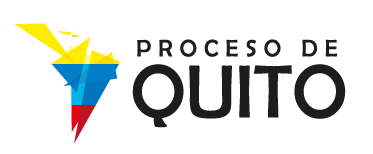MEMBER STATES UNANIMOUSLY SIGN THE 8TH JOINT DECLARATION OF THE BRASILIA CHAPTER AT ITS CONCLUSION
Brasilia, July 1ST, 2022 – On July 1st, in Brasilia, the 13 member states of the Quito Process signed the commitments reached in the VIII Joint Declaration of the Quito Process. The countries also welcomed the commitment of the Government of Chile to assume the next Pro Tempore Presidency of the intergovernmental technical forum.
Member States signed the declaration (read the Joint Declaration here) during the second day of the Plenary session, and reaffirmed their commitment to continue supporting articulated solutions and exchange of good practices at the regional level to find common answers to the situation of human mobility of 5.1 million refugees and migrants from Venezuela in Latin America and the Caribbean, as well as for the communities that host them.
The document includes the work of the leading States in the field of socioeconomic integration, asylum, migratory regularization, orientation centers and temporary reception, COVID-19, education, gender equity, protection of children and adolescents, family reunification, human trafficking, and HIV/AIDS, as well as the contributions from webinars on groups in situations of vulnerability, host communities and migratory regularization and recognition of refugee status. All the excerpts of the Declaration reaffirm the commitment to move forward together as an intergovernmental technical forum.
"The Joint Declaration of the Quito Process sends a message of regional coordination and common agreement on the need to generate a response that continues to strengthen both the socio-economic integration of refugees and migrants and the host communities, and reiterates the concern at the continuing crisis of human mobility in the region and the possibility that it will be made invisible" stated Eduardo Stein, UNHCR-IOM Joint Special Representative for Refugees and Migrants from Venezuela, present at the event.
With the leadership of Brazil, in the Pro Tempore Presidency, the Quito Process advanced in this period in the consolidation of a roadmap with the Group of Friends (made up of Spain, the Netherlands, Switzerland, Germany, France, the European Union, the United Kingdom, Canada, the United States, Italy and the Inter-American Development Bank (IDB), in the launch of the Regional Strategy against Xenophobia, in the review of its internal processes to improve the dynamics of participation in the Quito Process, as well as in an initial measurement of the scope that the recommendations from the Quito Process have had in the public policies and regulations of the member countries.
It is also recognized that States have made efforts in the development of strategies that allow socio-economic and educational integration, as well as in health plans, with a focus to the protection of Venezuelan refugees and migrants in all the thematic axes of the Quito Process.
During the Plenary, Chile announced its decision to lead the IX Round of the Quito Process and work on the consolidation of the thematic axes with a regional approach oriented towards international cooperation.
UNHCR, the UN Refugee Agency, and IOM, the UN Migration Agency, which support the Quito Process, welcomed the commitments made.
What is the Quito Process?
The Quito Process is a regional technical workspace of 13 countries in Latin America and the Caribbean, created in 2018 at the initiative of Ecuador, with the support of UNHCR and IOM. Within the Quito Process, the States (Argentina, Brazil, Chile, Colombia, Costa Rica, Dominican Republic, Ecuador, Guyana, Mexico, Panama, Paraguay, Peru, and Uruguay) are developing coordinated responses to the institutional challenges generated in Latin America and the Caribbean by the flows of refugees and migrants from Venezuela.
Countries participate in plenary meetings and technical spaces, from which emerge the conclusions that enrich the Joint Declaration, which generates recommendations that each State can adopt, at its discretion.
Access here the Joint Declaration in Spanish.


